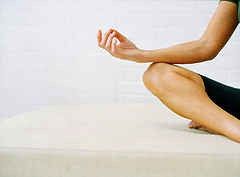Relaxation Methods to Relieve Stress
What the Experts Forgot to Tell You
Article contributed by Ryan Rivera
The value of relaxation methods are explained by nearly every anxiety and stress relief expert.
They're at the heart of any anxiety reduction technique, because they're one of the few things that you can do in the comfort of your own home in order to feel as though you're regaining a sense of control and balance into your life.
There are many different strategies, but the most well-known include:
- Visualization
 photo courtesy of jessebezz, on Flickr
photo courtesy of jessebezz, on FlickrEach of these is considered effective at helping you relieve stress, and each one is praised as a great strategy for combating your stress and anxiety symptoms.
But many people try these exercises and see no results. Eventually they give up and decide that relaxation exercises are not right for them, turning to less effective strategies as a result.
Why don't these relaxation exercises work, and what can you do to control your stress at home ?
The Forgotten Part
The reality is that each of those types of breathing and relaxation methods does work. But the people that explained to you how to do those exercises forgot the most important part: practice.
None of these exercises work from the beginning because none of these exercises are stress free when you're first starting out. Instead, you actually become more stressed as you try to do each exercise correctly.
When you're just starting out, you're constantly checking and re-checking to make sure you've done everything right. You consistently think about how you're supposed to feel, how you currently feel, and whether or not it's working.
All of those thoughts increase your stress.
Relaxation Methods work, but they can't work if you're thinking about everything. They can't work if you're focused too much on whether or not they're working, or how to do them correctly or if they work or not. They can only work when they're simple, easy, and you don't worry about them.
How to Stop Worrying
The key is simply commitment. You need to be willing to commit to each of these exercises until they become natural and second nature. Don't expect them to work. Keep doing them every day until they become "boring." Practice daily until you're no longer thinking about whether or not they work, and you're no longer trying to remember what each step is.
Breathing and relaxation techniques take considerable commitment. You need to do it daily, or as close to daily as possible, and not expect to find any relief at all. You're simply doing the exercise in order to do the exercise.
Over time it will start to become natural and you won't think about each step in the process. You'll start to do every part of it without thinking, and then – once you're performing the exercise as though you've always been a master at it – that's when it will start providing you with the relaxation benefits you're looking for.
The Second Nature of Relaxation Methods
It's said that baseball players that think about their swing often swing worse, because they're focused too much on each component of the swing and it no longer feels natural to them. That's why they have a lot of rituals before each at bat – so that they can take their mind off the swing and focus it instead on simply walking up to the plate.
It's the same with breathing and relaxation methods. If you're just starting out and you have to think about each exercise, it's not going to work. But if you have completed it so many times that it's natural to you, that's when your mind will stop focusing on trying to do everything right and instead will allow you to easily relax and live with less stress.
About the Author:
Ryan Rivera no longer has anxiety, but still uses relaxation exercises to stop his anxiety from coming back. He writes about anxiety at www.calmclinic.com.
Related Articles
- 10 Simple Relaxation
Tips
- Relaxation
Exercises to Help Control Stress
- Why not try Yoga
Relaxation Techniques ?
- Progressive
Muscle Relaxation Made Simple
- Breathe Away Stress: Breathing Relaxation Techniques
Return from Relaxation Methods to Relaxation Techniques for Stress & Anxiety Reduction
Return to Soothing Stress Relief Home